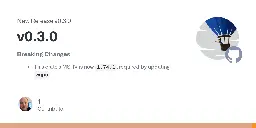What do people love about Rust?
BB_C @ BB_C @programming.dev Posts 10Comments 364Joined 2 yr. ago
BB_C @ BB_C @programming.dev
Posts
10
Comments
364
Joined
2 yr. ago
When I found out even Rust needed the clib, it was like seeing an iron-clad fortress only to look closer and see it was being held up by sticks, ducktape, and prayers.
Rust tops a diverse list of implementation languages in projects getting NLnet grants, Python 2nd, C is alive, and C++ is half dead!
Rust tops a diverse list of implementation languages in projects getting NLnet grants, Python 2nd, C is alive, and C++ is half dead!
Koto: a simple and expressive programming language, usable as an extension language for Rust applications, or as a standalone scripting language
Koto: a simple and expressive programming language, usable as an extension language for Rust applications, or as a standalone scripting language




/me putting my Rust (post-v1.0 era) historian hat on.
The list of (language-level) reasons why people liked Rust was already largely covered by the bullet points in the real original Rust website homepage, before some "community" people decided to nuke that website because they didn't like the person who wrote these points (or rather, what that person was "becoming"). They tasked some faultless volunteers who didn't even know much Rust to develop a new website, and then rushed it out. It was ugly. It lacked supposedly important components like internationalization, which the original site did. But what was important to those "community people" (not to be confused with the larger body of people who develop Rust and/or with Rust) is that the very much technically relevant bullet points were gone. And it was then, and only then, that useless meaningless "empowerment" speak came into the picture.